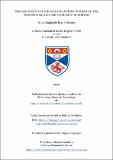Files in this item
The bad guys with the good solutions? Energy elites, transitions, and the 'good life' in Norway
Item metadata
| dc.contributor.advisor | High, Mette M. | |
| dc.contributor.author | Seeger, Anna Raphaela Kyra Katharina | |
| dc.coverage.spatial | 162 | en_US |
| dc.date.accessioned | 2023-05-11T15:30:49Z | |
| dc.date.available | 2023-05-11T15:30:49Z | |
| dc.date.issued | 2023-06-12 | |
| dc.identifier.uri | https://hdl.handle.net/10023/27583 | |
| dc.description.abstract | In this thesis I examine how strategically situated energy industry professionals conceptualise and act upon energy transitions in Norway. Analytically I refer to interlocutors as ‘energy elites’. This allows me to highlight their shared socio-economic, educational, and professional positionalities while showing key distinctions in their perceptions of energy. I draw on 18 months of ethnographic fieldwork in Oslo between 2018-2020 where I engaged with over 100 industry leaders and experts. I conducted fieldwork at the formal office spaces of Norway’s major energy corporations and in the private spaces that interlocutors inhabited. This allows me to make three main contributions: Firstly, I use my detailed ethnographic insights to counter dominant scholarly presumptions that see elites as resisting socio-economic changes in order to preserve their own status. I demonstrate that the way my interlocutors engaged with energy transitions involved personal, societal, and ethical considerations of how energy production can ensure a ‘good life’. Thus, I argue that strategic pursuits alone cannot account for the varied ways in which industry professionals engaged with energy transitions. Secondly, I expand on the regional literature by critically examining dominant narratives of a ‘successful’ Norwegian energy model. I analyse how increasingly industry professionals scrutinised the socio-environmental sustainability of their hydrocarbon and renewable energy production in light of growing climate change concerns. Lastly, I contribute to the study of energy transitions, as I analyse them as liminal, in-between processes marked by contestation and ambiguity. I suggest that various energy imaginaries make energy transitions uncertain ‘rites of passages’ without clearly defined end goals or pathways. By advancing scholarship on elites, energy, and transitions, my study demonstrates that contested visions of energy futures are united in their desires for a ‘good life’. | en_US |
| dc.description.sponsorship | "This project has received funding from the European Research Council (ERC) under the European Union's Horizon 2020 research and innovation programme under grant agreement No 715146. This work was also supported by the Russell Trust Award from the University of St. Andrews to carry out fieldwork travel."--Acknowledgements | en |
| dc.language.iso | en | en_US |
| dc.rights | Creative Commons Attribution-NonCommercial-NoDerivatives 4.0 International | * |
| dc.rights.uri | http://creativecommons.org/licenses/by-nc-nd/4.0/ | * |
| dc.subject | Energy transition | en_US |
| dc.subject | Sustainability | en_US |
| dc.subject | Elites | en_US |
| dc.subject | Energy industry | en_US |
| dc.subject | Climate change | en_US |
| dc.subject | Energy industry leaders | en_US |
| dc.subject | Anthropology | en_US |
| dc.subject | Norway | en_US |
| dc.subject | Oil and gas | en_US |
| dc.subject | Hydrocarbons | en_US |
| dc.subject | Renewable energy | en_US |
| dc.subject | The good life | en_US |
| dc.title | The bad guys with the good solutions? Energy elites, transitions, and the 'good life' in Norway | en_US |
| dc.type | Thesis | en_US |
| dc.contributor.sponsor | European Research Council (ERC) | en_US |
| dc.type.qualificationlevel | Doctoral | en_US |
| dc.type.qualificationname | PhD Doctor of Philosophy | en_US |
| dc.publisher.institution | The University of St Andrews | en_US |
| dc.identifier.doi | https://doi.org/10.17630/sta/448 | |
| dc.identifier.grantnumber | 715146 | en_US |
The following licence files are associated with this item:
This item appears in the following Collection(s)
Except where otherwise noted within the work, this item's licence for re-use is described as Creative Commons Attribution-NonCommercial-NoDerivatives 4.0 International
Items in the St Andrews Research Repository are protected by copyright, with all rights reserved, unless otherwise indicated.


